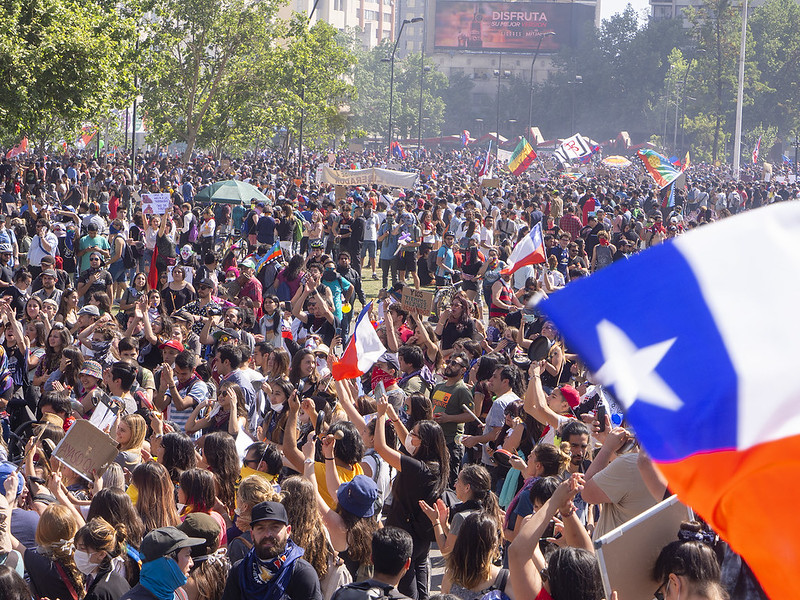Corruption unleashed
The knowledge of the corruption scheme of public institutions, embodied by the most powerful and prestigious lawyer of the Chilean elite, Luis Hermosilla (“Here we are doing something that is a crime… that is a crime. And it is the only way to do it”) and the resignation of councillor María Inés Horvitz and her subsequent statements (“The co-optation of the state by de facto powers linked by birth, politics, and money is increasingly visible”), give a clear indication of the advance and proliferation of this increasingly evident phenomenon in the upper echelons of our society.
The illicit appropriation of resources, in a structural and sophisticated manner, by people linked to politics, business, carabineros, the army, municipalities, and government bodies, the mistakenly called “good people”, takes place behind the backs and in full view and patience of a people who struggle daily for a dignified survival, and that for some, such as the lawyer, former Minister of Justice of the Concertación and current Secretary General of “Amarillos por Chile”, Isidro Solís, are “quite frequent practices” of many years.
Under the dictatorship, corruption, understood as collusion between the economic and political powers, mainly benefiting the former, led to monumental “transfers of resources” of tens of billions of dollars from the state to large economic groups through various mechanisms, including the sale of large and medium-sized state-owned companies, and the transfer of pension and health funds to private entities, in favour of the business elite.
Likewise, regulations were established that allowed tax “dodging” by successful businessmen, executives, and professionals through the famous “ghost” companies, which today still make gigantic profits by not paying taxes. Added to this are the procedures of the Internal Revenue Service (SII) for almost total reductions in fines for non-compliance with tax laws and the exclusive “privilege” of the SII to file a lawsuit for tax offences to the detriment of the actions taken by the prosecutors to initiate legal proceedings, even when there is evidence.
In this scenario, state institutions such as the National Congress, the Armed Forces, the Carabineros, and the municipalities (in terms of their “municipal corporations”) are not subject to the supervision of the Comptroller General of the Republic, thus making room for nepotism, influence peddling, conflicts of interest, abuse of privileged information, misappropriation of tax funds, price collusion by big business and many other forms of corruption.
The pressure exerted by the political-economic power duo, plus the “negligent” conduct of governments, prosecutors, and courts when it comes to condemnation, makes unfeasible legal processes that end with solved cases, appropriate sentences for the crimes and those responsible for restoring the public damage caused, This results in convenient agreements for the “collar and tie” criminals, such as the well-remembered ethics classes (the “Penta” case) and tax pardons for economic groups (Yarur, Saieh, Said, Angelini, SQM groups, among others that illegally financed campaigns), and impunity, a key factor in consolidating corruption.
An essential state answer for it to make Dignity a habit
In this scenario, we clearly state that it is difficult to confront corruption because it mutates and adopts new and complex forms, with the duality of the exercise of public functions between politics and administration, and a society that is constantly evolving and raising new problems.
The challenge to eradicate it is not only the care and good use of public resources but also to strengthen probity by assuming a political commitment at the highest level to eradicate public and private delinquent practices, to prevent the emergence of new problems. and private criminal practices, as well as promoting effective regulatory changes to strengthen institutional capacities and the design and implementation of public integrity policies that have an impact on the functioning of the administration and the perception of citizens.
To curb this problem, the country needs the active and vigilant participation of citizens, collectively or individually, to report all acts of corruption to the corresponding entities; that oversight and legal entities have sufficient staff, financial, material and technology resources to carry out their work; and that there is an explicit policy, as a country, as a State, of the autonomy of the judiciary as a whole, which includes mechanisms to protect against external influences in its decision-making.
This necessarily involves changing the current procedures, to have an adequate appointment of candidates for judges through a collegiate body, their election by the citizens, their permanence in office based on performance and competence, and citizen scrutiny that allows even their dismissal, ensuring that political and economic power does not influence them.
It is indisputable that corruption undermines democracy and hinders economic growth, and its effects have profound consequences on the majority of the country’s poor, whose living conditions depend to a large extent on the state. It is not a problem of deficient administrative processes or ineffective public policies, but a moral imperative for all those who exercise a public function, in pursuit of respect for human rights, the consolidation of a better democracy, and the improvement of living conditions for all people.
“We speak of a social revolution that drastically changes the living conditions of the people, of a political revolution that modifies the structures of power and, in short, of a human revolution that creates its paradigms to replace the current decadent values” (Silo).
Collaborators: M. Angélica Alvear Montecinos; Guillermo Garcés Parada; Sandra Arriola Oporto; Ricardo Lisboa Henríquez and César Anguita Sanhueza. Public Opinion Commission






